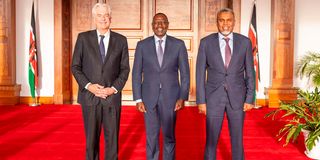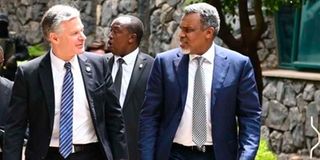
President William Ruto (centre), Central Intelligence Agency Director William J Burns (left), and National Intelligence Service Director Noordin Mohamed Haji pose for a photo after holding talks at State House in Nairobi.
An upgrade of Kenya’s security surveillance system, establishment of another US military base, and concerns over abductions featured in separate talks between President William Ruto and foreign intelligence chiefs, Nation has established.
During a meeting at State House, Nairobi, on Monday, Central Intelligence Agency (CIA) Director William Burns is reported to have discussed with President Ruto how to strengthen Kenya’s security role in the region through deployment of the new surveillance system.
At the meeting also attended by National Intelligence Service (NIS) boss Noordin Haji, the establishment of a new US military base in Turkana in Northern Kenya and the expansion of the Manda Bay base in Lamu was also discussed as the Americans look to increase their presence in the region.
Sources told Nation as part of strengthening Kenya’s security capability, the CIA boss offered to boost NIS operations through the purchase of a modern telecommunication system to boost intelligence work.
Read: US envoy Whitman denounces police use of phones to track suspects: 'Privacy should be respected'
“If a deal is reached, we (Kenya) will get new surveillance machines that will boost intelligence gathering. This was one of the proposals during the meeting as a way of boosting the cooperation between these two countries,” said the security source familiar with the discussions.
Burns had first visited Nairobi in January.
Then in June, days before the Gen Z anti-government protests that culminated in the June 25 raid on Parliament, Federal Bureau of Investigations (FBI) Director Christopher Wray came calling for five days.
The second visit in a year on Monday by the CIA boss highlighted high stakes at play between the two countries even as sources said the US official also communicated displeasure with a spate of abductions linked to the State.
This high-profile visit came a week after Britain’s MI6 Chief Richard Moore also met President Ruto at State House. British High Commissioner to Kenya Neil Wigan accompanied UK’s top spy to the meeting on October 22.
Nation has now established that both Burns and Moore also expressed concerns with abductions and the manner in which State agencies were targeting human rights defenders and individuals critical of the government.

US Federal Bureau of Investigations chief Christopher Wray and National Intelligence Service Director Director-General Noordin Haji in Nairobi.
Both Burns and Moore are understood to have pressed Kenyan authorities to end a spate of what is believed to be State-sanctioned abductions. President Ruto has repeatedly denied knowledge of the abductions.
Sources said the British have threatened to withdraw funding to key projects funded by the UK government should the abductions continue.
Multiple sources familiar with the discussions told Nation in confidence that Burns had impressed on the President and NIS boss to end the abductions believed to be State-sponsored.
During the meeting, the sources said, the abduction of some Turkish citizens, including a Briton by masked men on October 19 in Nairobi also featured.
The Briton identified as Necdet Seyitoğlu was released by his abductors after eight hours in captivity.
The Kenyan government has since confirmed that Kenya handed over the four Turkish nationals to the Turkish government. The action has drawn international condemnation because the group had refugee status and had fled persecution.
According to sources familiar with the discussions, the M16 boss also sought assurance from Kenya that British nationals would be guaranteed of their safety while in the country.
Yesterday, Georgina Woodhouse-Hills, the Head of Communications at the British High Commission in Nairobi said:” I’m afraid I am not at liberty to disclose any details about the visit beyond those put into the public domain by the President.”
“It is the longstanding policy of successive UK governments not to comment on intelligence matters,” added the British High Commission Spokesperson.
Following the abduction of the British national, BBC media reported that the UK foreign office had promised to look into the matter.
BBC reported that the UK Foreign Office was "providing consular support to a British man and his family following an incident in Kenya".
In 2021, a Nairobi-based Turkish billionaire, Selahaddin Gulen, who was abducted by Turkish officials was flown back to his country where he was set to be tried for being a member of the outlawed Fetullah Terrorist Organisation (Feto).
Fettullah Gulen, who is an uncle of the repatriated man, at the time sought asylum in the US after being accused of orchestrating a failed military coup in Turkey in 2016. Gulen, a reclusive Muslim leader who built a powerful Islamic movement in Turkey amid accusations of orchestrating an attempted coup against Turkish President Tayyip Erdogan in 2016, died in exile in the US on October 21.
The US government had at the time declined to extradite Fettulah Gulen who had been granted asylum in the US and cited that the Turkish authorities had not committed to uphold his human rights.
Fettulah Gulen is linked to several schools in Kenya including the Light academy in Nairobi and Mombasa.
In his last visit, FBI director, who held meetings with security chiefs and toured the DusitD2 Hotel complex where al-Shabaab terrorists killed at least 21 people in 2019, also signaled Kenya’s star role in the war against terrorism in Africa.
During the visit, Mr Wray attended the first commander’s meeting of the Joint Terrorism Task Force in Kenya (JTTF-K), a multi-agency team established in 2020 following the DusitD2 attack and which is modelled after the FBI-led JTTF.
This latest visit to Nairobi by the CIA and MI6 chiefs come amid rising global concerns about terrorism financing particularly the activities of al-Shabaab in neighbouring Somalia as well as wars in Sudan and the Democratic Republic of the Congo (DRC).
A Source in the presidency told Nation that, with the ongoing war in Gaza and growing conflict in the Middle East where Israel has taken on Iran and Lebanon’s Hezbollah, global powers have signaled an urgency to discuss counter-terrorism strategies with regional partners.
On March 11 this year, the US government imposed sanctions on al-Shabaab money launderers in the United Arab Emirates (UAE) and Eastern Africa, who were accused of abetting the group, whose operations net over $100 million (Sh13 billion) per year, particularly through extortion.
Some Kenyans, including the owner of a bus company, were among over a dozen individuals and groups sanctioned by the US Department of the Treasury’s Office of Foreign Assets Control (Ofac).
The US imposed sanctions on “16 entities and individuals who compose an expansive business network spanning the Horn of Africa, the UAE, and Cyprus that raises and launders funds for al-Shabaab, a terrorist group affiliated with al-Qa’ida.”
“Individuals within this network include influential businesspeople in the region that lend financial backing to al-Shabaab, a terrorist group responsible for some of the worst terrorist attacks in East Africa’s modern history,” read a statement by the US government.
Read: Cricket: Kenya halt losing streak against Rwanda
“The United States is committed to working with regional partners to root out terror financing networks and the entities they abuse to raise and move funds,” said Under Secretary of the Treasury for Terrorism and Financial Intelligence Brian Nelson at the time.
In Sudan, the violent power struggle between General Mohammad Fattah al-Burhan’s Sudanese Armed Forces (SAF) and General Mohamed Hamdan Dagalo’s (Hemedti’s) Rapid Support Forces (RSF) has drawn in foreign forces, including the Wagner Group—a private military company closely linked to the Russian government. Media reports have indicated that the Russian mercenary group has been supplying RSF with weapons to aid their fight against the country’s army.
Russia’s invasion of Ukraine has spawned a protracted war that has drawn in North Atlantic Treaty Organisation (Nato) powers led by the US, who are arming Ukrainian forces.
Yesterday, Mr Jim Onyango, the head of communication at the US Embassy in Nairobi declined to comment on discussions between Burns and President Ruto including specific questions about the military bases, surveillance system and concerns about abductions.
Mr Onyango referred us to an email for the CIA which hadn’t been responded to by the time of going to press.
State House spokesperson Hussein Mohammed had also not responded to Nation’s inquiries.








